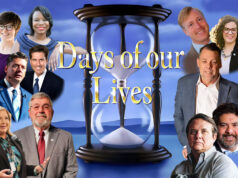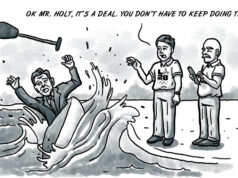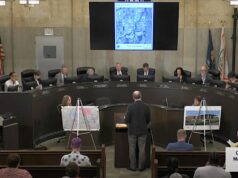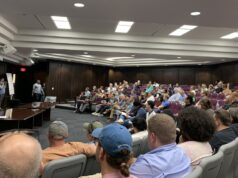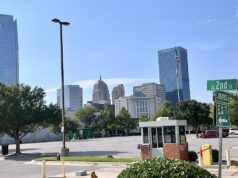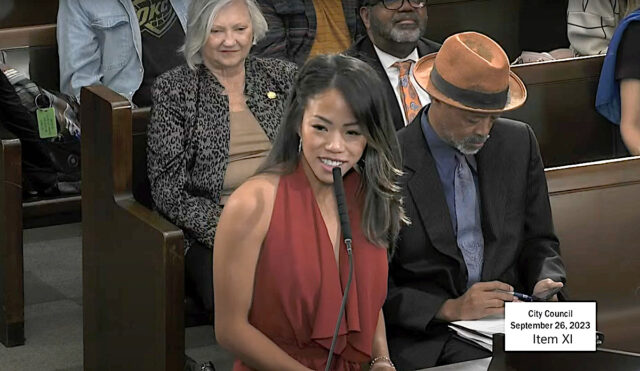
The OKC City Council set a Dec. 12 election date for a proposed new taxpayer-funded arena for the Oklahoma City Thunder, approved a letter of intent with the team that would keep the Thunder here beyond 2050, and passed a resolution exploring the idea of the team being required to pay arena workers a living wage during its meeting today.
The lengthy meeting marked the first opportunity for members of the public to address the City Council about the proposed arena, which was formally announced two weeks earlier. Tuesday’s meeting featured remarks by a wide cross-section of residents, from OKC Chamber of Commerce-affiliated business owners to citizens who wore their Thunder gear to the council chambers.
City manager Craig Freeman said the minimum cost for the arena will be $900 million, with an opening date targeted for 2029. Its actual cost could exceed that amount, however. The NBA franchise’s ownership group will contribute $50 million, or roughly 5.5 percent of the construction costs. Another $70 million would come from MAPS 4 funds that had been earmarked for the Paycom Center if the plan is approved by voters Dec. 12.
The balance of the arena’s construction costs would be funded by extending the existing MAPS 4 sales tax six additional years. The resolution calling for the Dec. 12 public vote passed 7-2, with Ward 6 Councilwoman JoBeth Hamon and Ward 7 Councilwoman Nikki Nice opposing it.
In its most recent report released this week, the city reported a small dip in sales tax collections for the past month. General fund collections were $27.6 million. That total is about $339,000 less than last year at this time, according to a city press release. The September report includes collections from the last half of July and estimated collections in the first half of August.
Freeman told council members the team’s ownership group would not be responsible for any cost overruns unless they were a result of something the Thunder wanted in the design and construction phases.
Despite the day’s long discussion, no mention was made of where the new arena could be built or what would become of the Paycom Center afterward. Some have speculated it could be built on the current site of the former Cox Convention Center, which is owned by the city and leased to Prairie Surf Studios currently.
Hamon asks questions about transparency, process
Hamon pressed Freeman, the OKC city manager, on some specifics of the new arena proposal, including why it has not been subject to public meetings and why she has not been informed about developments in the process.
“I heard one commenter reference the press release that went out just a few minutes after all of the council was fully briefed on this proposal a few weeks ago mentioning this very public discussion that happened, so I have a few questions about this process because I have been trying to have conversations about this for over a year with the city manager and didn’t get very far in proposing potential ideas or for updates that had concrete information,” Hamon said. “So I am curious to know how many meetings were held or task forces to study market comparison to know that we’re getting a fair deal compared to other markets?”
Freeman said no meetings or task forces were assembled to study arena deals in other cities.
“We had looked at what other teams have, what other deals are out there, but at the end of the day we’re sitting down with one team — the team that’s here and willing to stay here with an awareness of what those other deals (are) while also understanding we’re in a different market than those other teams,” Freeman told Hamon.
OKC Mayor David Holt also defended the process and the proposed agreement with the Thunder, which has the team paying a modest 5.5 percent of the arena’s total cost while teams in other cities have paid considerably more.
“We certainly brought many ideas that originated from the council or originated from the public or originated from us to those conversations, but ultimately what you see today are the terms in which the Thunder are willing to sign a long-term agreement in Oklahoma City,” Holt said. “The only leverage we as a city have is our willingness to not move forward in this relationship.”
Dozens of citizens speak for and against new Thunder arena
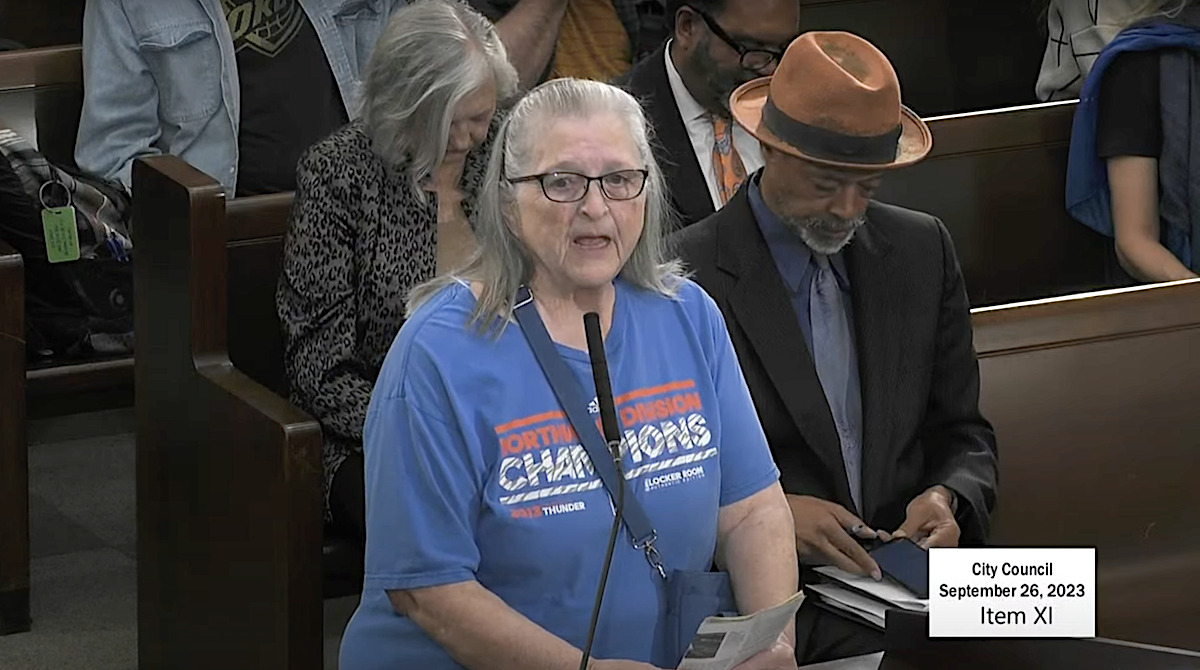
Those comments came after 36 members of the public addressed the council with their own views on the proposed arena. Some said the arena is a must-have if the city wants to continue its momentum, while others questioned spending priorities.
OKC resident Edward Morris criticized Holt and Freeman’s negotiations with the team.
“We’ve heard the mayor say there is no Plan B, and that’s a huge problem, and the mayor should be held accountable for this,” Morris told the council. “I think that’s because the person negotiating with the Thunder isn’t negotiating for the people of OKC but rather as the author of a book called Big League City and for the inflated idea of what a sports franchise can do for a city.”
Plenty of people spoke out in favor of the Thunder and the arena. Glenda Love, wearing a t-shirt from the Thunder’s Western Conference title more than a decade ago, said she waits for the team at the airport when they come home from games.
“The owners don’t have to threaten to leave, the NBA will step in and they will tell our city you don’t have a team anymore,” she told the council. “If we don’t move forward, we will slide back.”
OKC resident Randy Ward said he has supported other MAPS projects and intends to support the new arena.
“The Thunder is a unifying force,” he told the council. “Everyone is for the Thunder. I think most people are. I think it’s a unifying force, and I would ask you to vote for it.”
Jenny Nguyen, whose family owns the Lee’s Sandwiches franchise on Classen Boulevard, said she supports the arena proposal because of the benefits it would bring the city.
“The Asian District is a gem of our city, and restaurants and businesses depend on people,” she told the council. “We depend on tourism. We depend on having a city people want to live in. I know that the arena will make a positive impact in our community, just like it has before.”
Others were less enthusiastic about the proposal. Tahirah Johnson said the new arena comes with a hefty price tag for everyone.
“This is a very large subsidy that essentially supports the entertainment of a small number of upper-income spectators,” she told the council Tuesday. “Too many other areas need more funding, such as sidewalks, dedicated public transit funding, school funding, and affordable housing subsidies. At a minimum cost of $900 million in tax dollars to build and an OKC population of 650,000, the subsidy to this well-off group for a new arena is more than $1,300 for each city resident.”
Nick Singer, one of the organizers of a campaign against the arena proposal, said he believes the city’s fiscal priorities are out of alignment. That group launched buyyourownarena.com on Tuesday.
“I speak today as a citizen deeply concerned about the priorities of taxation and spending in our city,” Singer told the council. “I appreciate the role of government in our community. I understand clearly there are many services I enjoy or wish to see that the private sector motivated by profits cannot or will not provide. What I’ve never understood is why our city is so obsessed with helping wildly profitable and wealthy private enterprise do things that they can do on their own.”
Potential community services agreement in the works
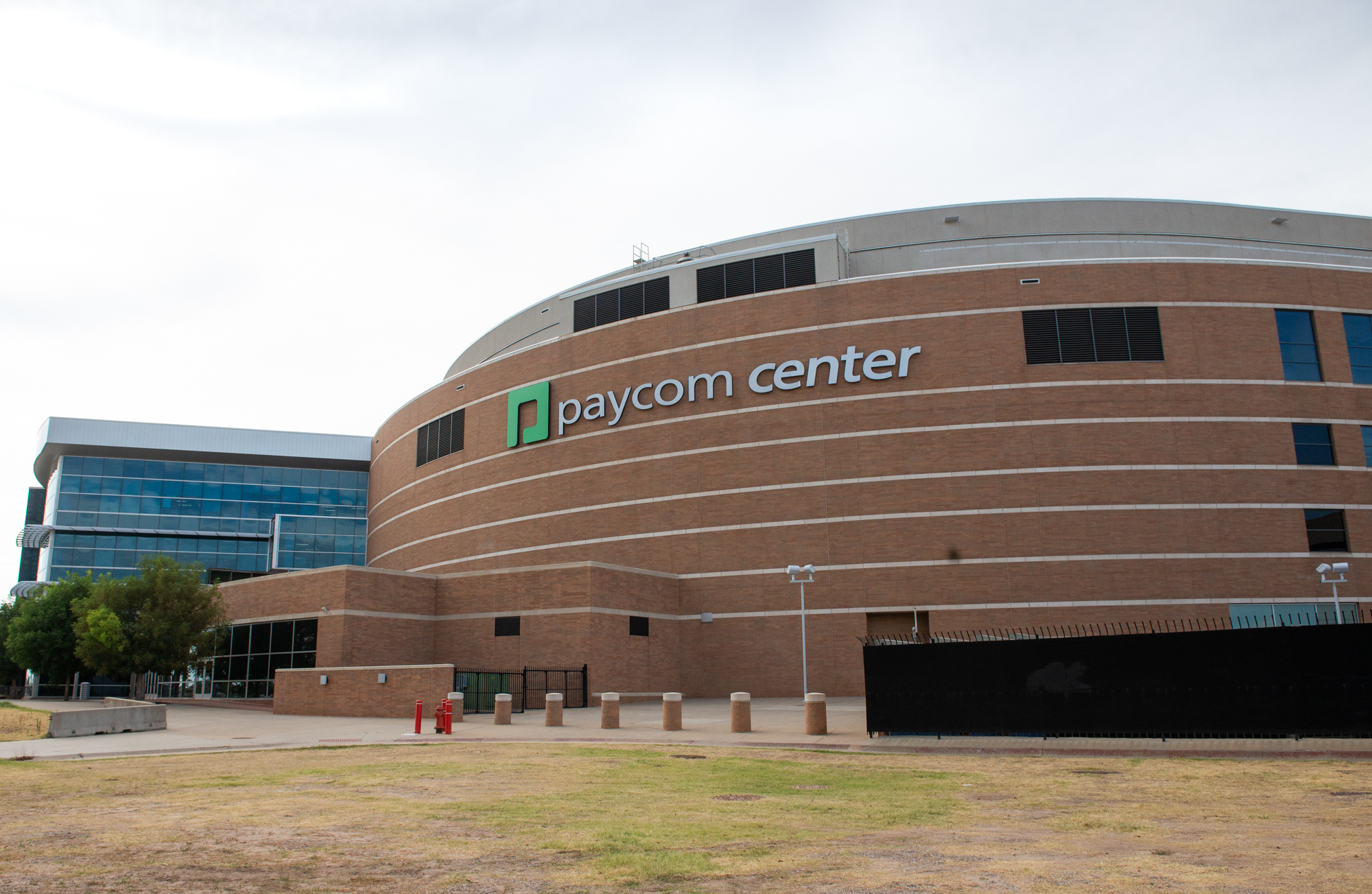
By an 8-1 vote, the OKC City Council also approved a resolution that would direct the city manager to negotiate “the payment of regionally competitive wages commensurate with those paid by the City of Oklahoma City and its trusts, and further directing the creation of a working group to study and deliver findings and potential recommendations regarding the use of a labor peace agreement in the operations of the new arena.”
The resolution, brought forward by Ward 2 Councilman James Cooper, marks an early stage of what could become a community services agreement between the city and the Thunder. Only Ward 8 Councilman Mark Stonecipher voted against the resolution.
The potential agreement stems from Milwaukee when that city built a new arena for the Bucks, its NBA team. In that agreement, team owners agreed to pay arena workers a liveable wage. Cooper’s plan would also target employment from people from OKC’s most economically challenged zip codes.
Cooper told NonDoc earlier this month he had planned to introduce the resolution.
“For me, the most important question facing us in the conversation is are we really ensuring that we level up similar to what Milwaukee did with the owners of the Bucks,” Cooper said Sept. 12. “The creating of a hiring haul targeting areas of that city that had been the hardest hit by underemployment and unemployment. I think we need to be intentional in our outreach. There’s absolutely no reason why we shouldn’t be trying to mirror that.”
Cooper echoed those comments during Tuesday’s pivotal City Council meeting, adding that he and Ward 1 Councilman Bradley Carter represent some of the city’s most economically disadvantaged residents. Cooper called for the recruitment of potential employees from areas that could use the most help.
“It will take each one of us ward by ward to tap into our networks to figure out where is Frances Tuttle, where is Metro Tech, where is OCCC, where is OSU-OKC,” Cooper told the council Tuesday. “Bradley (Carter) and I have ZIP codes that have two of the highest eviction rates in the county. It’s time we tap in and meet our people where they are.”
The idea was also supported by Ward 4 Councilman Todd Stone.
“Part of the reason I support Councilman Cooper’s resolution is there are three components in it,” Stone said. “The first one being programs for jobs. We’ve been talking about how we can build that pipeline to construction as well as hospitality to where people who may not have the skillsets they need are able to learn those skillsets. You think about the construction of this thing, it’s a pretty big project. You also look at the development of what’s happening in the city. People come in and spend hundreds of millions in projects here, and they do that because they see the city is investing in itself and continuing to move forward.”
In his closing remarks, Holt, who has been leading the charge for a new arena, said the benefits to the city outweigh the costs to taxpayers.
“I think that for the concerts, for the major league sports, for the quality of life, the community unity and the economic impact and growth, the international brand, the economic ability to help all people, the ability to help all people and the philanthropy, and we can do all that without a tax increase I think is a win-win,” Holt said. “But as has been said many times here, the people get to decide based on what we’re about to do, and I think that’s the most beautiful thing of all.”










